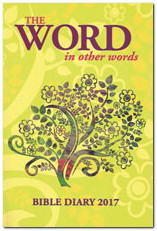THE WORD
Heb12,1-4/Mk 5,21-43
When Jesus had crossed again (in the boat) to the other side, a large crowd gathered around him, and he stayed close to the sea. One of the synagogue officials, named Jairus, came forward. Seeing him he fell at his feet and pleaded earnestly with him, saying, "My daughter is at the point of death. Please, come lay your hands on her that she may get well and live." He went off with him, and a large crowd followed him and pressed upon him.
There was a woman afflicted with hemorrhages for twelve years. She had suffered greatly at the hands of many doctors and had spent all that she had. Yet she was not helped but only grew worse. She had heard about Jesus and came up behind him in the crowd and touched his cloak. She said, "If I but touch his clothes, I shall be cured." Immediately her flow of blood dried up. She felt in her body that she was healed of her affliction. Jesus, aware at once that power had gone out from him, turned around in the crowd and asked, "Who has touched my clothes?" But his disciples said to him, "You see how the crowd is pressing upon you, and yet you ask, 'Who touched me?"' And he looked around to see who had done it. The woman, realizing what had happened to her, approached in fear and trembling. She fell down before Jesus and told him the whole truth. He said to her, "Daughter, your faith has saved you. Go in peace and be cured of your affliction."
While he was still speaking, people from the synagogue official's house arrived and said, "Your daughter has died; why trouble the teacher any longer?" Disregarding the message that was reported, Jesus said to the synagogue official, "Do not be afraid; just have faith." He did not allow anyone to accompany him inside except Peter, James, and John, the brother of James. When they arrived at the house of the synagogue official, he caught sight of a commotion, people weeping and wailing loudly. So he went in and said to them, "Why this commotion and weeping? The child is not dead but asleep." And they ridiculed him. Then he put them all out. He took along the child's father and mother and those who were with him and entered the room where the child was, He took the child by the hand and said to her, "Talithakoum," which means, "Little girl, I say to you, arise!" The girl, a child of twelve, arose immediately and walked around, (At that) they were utterly astounded. He gave strict orders that no one should know this and said that she should be given something to eat.
IN OTHER WORDS
Today's gospel describes two sublime miracles: the healing of a hemorrhaging woman and the resuscitation of a dead girl. One would imagine them happening in a quiet place of prayer, with candles all around and the smell of incense up in the air. In short, in a right place and a right time. Not, as the gospel describes it, in a street of pressing (probably cursing) crowds and wailing "crying ladies"! Furthermore, Mark's use of the adverb "immediately" at various points in the Gospel serves to highlight the "frenzied-ness" of the situation.
Yet in the midst of this "very wrong place and time" healing and life arise. And Mark does not fail to highlight the one thing that made these possible, that very thing not bound by place or time —faith, first, that of Jesus, then that of the sick woman and of the desperate father.
Nolan, in the book Jesus before Christianity, notes how most of the time when Jesus heals He says to the healed person, "Your faith has healed you." It seems that what Jesus really does is not so much heal a person's illness as restore his/her faith. And Nolan believes that Jesus can do this because He is oozing with faith and that His "faith-full-ness" seems to "contaminate" everyone whom He comes in contact with! What happened to the sick woman and the desperate father in this story illustrate this clearly. In these two persons we see how "contagious" Jesus' faith really is. And faith, even as small as a mustard seed can do wonders.
Let us then go near Jesus and whisper, "Lord increase our faith" not in the right place or in the right time, but right here, right now.
- Fr. Dante Salces Barril, SVD (Rome, Italy)
The Word in other words 2017
An annual project of Logos Publications, The WORD in Other Words Bible Diary contains daily scripture readings and reflections written by priest, brothers, and sisters of the three congregations founded by St. Arnold Janssen (the SVD, SSpS, and SSpSAP). It hopes to serve as a daily companion to readers who continually seek the correlation of the Word of God and human experience.


